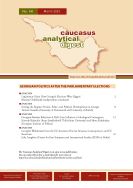Caucasus Analytical Digest (CAD)
Childpage navigation
The Caucasus Analytical Digest (CAD) is a quarterly internet publication jointly produced by the external page Caucasus Research Resource Center (CRRC-Georgia), the external page Research Centre for East European Studies (FSO) at the University of Bremen, the Center for Security Studies (CSS) at ETH Zürich, the external page Center for Eastern European Studies (CEES) at the University of Zurich and the external page German Association for East European Studies (DGO). The Caucasus Analytical Digest analyzes the political, economic, and social situation in the three South Caucasus states of Armenia, Azerbaijan and Georgia within the context of international and security dimensions of this region’s development. The CAD is edited by external page Lusine Badalyan, external page Sandra Fernandes, external page Farid Guliyev, external page Diana Lezhava, external page Lili Di Puppo, external page Jeronim Perović, external page Abel Polese, external page Koba Turmanidze.
The CAD corresponding editors are external page Heiko Pleines and external page Andreas Heinrich (co-editor), and the layout editor is external page Matthias Neumann.
All Issues
All CAD IssuesCurrent Issues

No. 142: Abkhazia's Relations with Russia
The special issue deals, on the one hand, with Abkhazia’s territorial relations with Russia, which have intensified over the last two decades. Bachelet’s article reveals the different dimensions of the Russian–Abkhaz integration. In particular, the disruption of contacts with (the rest of) Georgia since 1993 made Russia Abkhazia’s only real foreign partner. On the other hand, Blakkisrud and Kolstø analyze Abkhazia’s 2025 presidential elections, which were particularly notable due to unprecedented interference by Russia. The victory of their Russian-backed candidate raises several questions about Abkhazian sovereignty and the future of the country’s political landscape.

No. 141: Georgian Politics after the Parliamentary Elections
This issue looks at the geopolitical tension playing out in Georgia’s politics in the aftermath of the parliamentary elections of October 2024. The first contribution by Mariam Chikhladze provides an overview evidence indicating election manipulation. In the next article Tamari Gvasalia examines the relationship between police and political power in Georgia under the Georgian Dream party government, focusing on the state's response to the pro-EU protests in 2024. The last two contributions by Kornely Kakachia / Shota Kakabadze and Julia Langbein look at the role of Russia and the EU respectively.